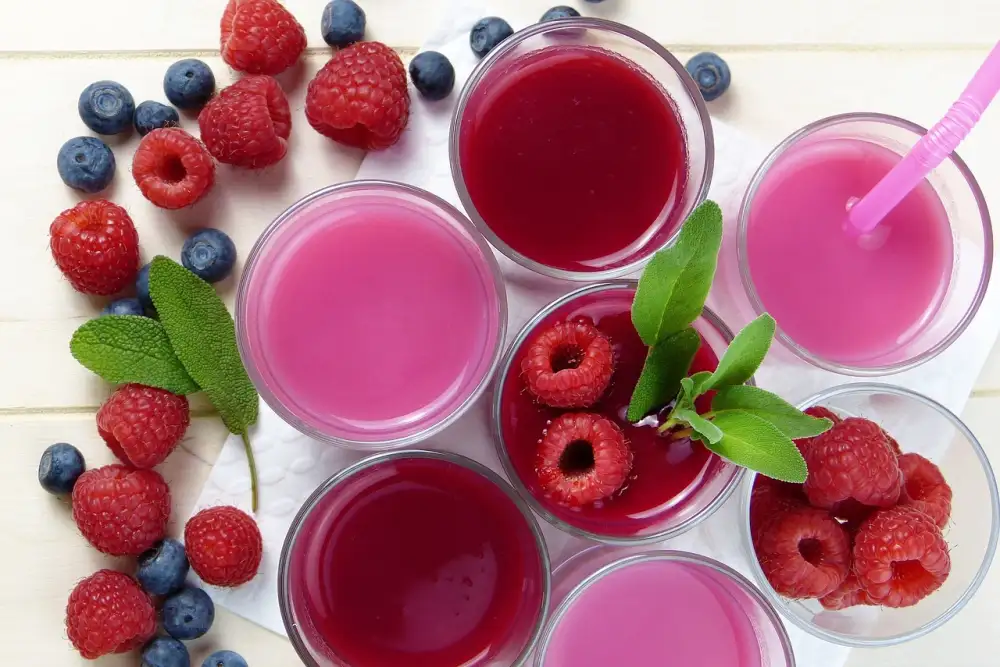Revitalize Your Health with a Juice Diet: Nourish Your Body and Boost Vitality

Are you looking for a way to revitalize your health and boost your vitality? Look no further than the juice diet! This popular trend has gained traction in recent years as more people are seeking natural and healthy ways to nourish their bodies. The juice diet involves consuming fresh, nutrient-rich juices made from fruits and vegetables, providing a concentrated dose of vitamins, minerals, and antioxidants. Say goodbye to processed foods and hello to a healthier lifestyle with the juice diet!
Benefits of the Juice Diet
The Juice Diet offers numerous benefits for your health and well-being. Firstly, it provides a concentrated source of essential vitamins, minerals, and antioxidants that are easily absorbed by the body. This helps to strengthen the immune system, promote healthy digestion, and support overall cellular function.
Secondly, the Juice Diet can aid in weight loss. By replacing high-calorie meals with nutrient-dense juices, you can reduce your calorie intake while still satisfying your hunger and providing your body with the necessary nutrients.
Additionally, the Juice Diet can improve your skin complexion and promote a youthful appearance. The abundance of vitamins and antioxidants in the juices help to nourish the skin from within, reducing signs of aging and promoting a healthy glow.
Furthermore, many people report increased energy levels and improved mental clarity when following a Juice Diet. By eliminating processed foods and focusing on fresh fruits and vegetables, you provide your body with clean fuel that supports optimal brain function.
Lastly, the Juice Diet can help to detoxify your body by flushing out toxins accumulated from unhealthy eating habits or environmental factors. The high water content in juices aids in hydration while supporting kidney function for effective detoxification.
Overall, embracing a Juice Diet can lead to improved health, increased vitality, enhanced weight management, radiant skin, mental clarity, and detoxification. It is a powerful tool for revitalizing your health and embracing a healthier lifestyle.
How the Juice Diet Works
The juice diet, also known as a juice cleanse or juice fast, is a method of detoxifying and rejuvenating the body by consuming only fresh fruit and vegetable juices for a certain period of time. The idea behind this diet is to give your digestive system a break from solid foods and flood your body with essential vitamins, minerals, and antioxidants found in fruits and vegetables.
During a juice diet, you'll be replacing your regular meals with freshly made juices. These juices are typically made using a juicer or blender to extract the liquid from fruits and vegetables while leaving behind the fiber. This allows for easy absorption of nutrients into the bloodstream, giving your digestive system a rest.
By eliminating solid foods and focusing solely on nutrient-rich juices, the body can efficiently absorb vitamins, minerals, and enzymes without expending much energy on digestion. This process helps to cleanse the body of toxins, improve digestion, boost energy levels, promote weight loss, and enhance overall well-being.
It's important to note that while the juice diet can be an effective way to jumpstart a healthy lifestyle or reset your eating habits, it should not be followed for an extended period of time. It is recommended to consult with a healthcare professional before starting any new diet plan to ensure it aligns with your individual health needs.
Types of Juices to Include in the Diet
When it comes to the Juice Diet, variety is key. Including a wide range of juices in your diet ensures that you receive a diverse array of nutrients and flavors. Here are some types of juices to include:
1. Green Juices: Packed with leafy greens like spinach, kale, and celery, green juices are rich in vitamins A, C, and K. They also provide essential minerals like iron and magnesium.
2. Citrus Juices: Oranges, grapefruits, lemons, and limes are excellent sources of vitamin C. These juices boost your immune system and promote healthy skin.
3. Beetroot Juice: Known for its vibrant color, beetroot juice is high in antioxidants and nitrates that improve blood flow and lower blood pressure.
4. Carrot Juice: Carrots are loaded with beta-carotene, which converts into vitamin A in the body. This juice promotes healthy eyesight and glowing skin.
5. Berry Juices: Blueberries, strawberries, raspberries - these antioxidant-rich fruits make delicious juices that support brain health and fight inflammation.
Remember to experiment with different combinations of fruits and vegetables to find your favorite flavors.
Tips for a Successful Juice Diet
1. Choose organic and fresh produce: Opt for organic fruits and vegetables to avoid harmful pesticides and chemicals. Fresh produce ensures maximum nutrient content.
2. Variety is key: Include a wide range of fruits and vegetables in your juices to ensure you get a diverse array of vitamins, minerals, and antioxidants.
3. Drink plenty of water: While on a juice diet, it's important to stay hydrated. Drink at least 8 glasses of water per day to support digestion and detoxification.
4. Listen to your body: Pay attention to how your body responds to different juices. If you experience any discomfort or allergies, modify your juice recipes accordingly.
5. Incorporate protein-rich ingredients: To maintain muscle mass and prevent nutrient deficiencies, add protein-rich ingredients like almond milk, chia seeds, or Greek yogurt to some of your juices.
6. Practice portion control: While juices are nutritious, they can still be high in natural sugars. Be mindful of portion sizes and don't overconsume.
7. Prepare in advance: To stay consistent with your juice diet, prepare your juices in advance and store them in airtight containers in the refrigerator for up to 72 hours.
8. Gradually transition into the diet: Start by replacing one meal with a juice and gradually increase the number of meals replaced until you're comfortable with a full juice diet.
9. Seek professional guidance: Consult with a nutritionist or healthcare professional before starting a juice diet, especially if you have any underlying health conditions or are taking medications.
Remember, the key to success is balance and moderation. A juice diet can be an effective way to revitalize your health, but it's important to listen to your body's needs throughout the process.
Potential Risks and Considerations
While the juice diet can be a great way to revitalize your health, it's important to be aware of potential risks and considerations before starting this type of diet.
1. Nutrient deficiencies: Although juices can provide a wide range of vitamins and minerals, they may lack certain essential nutrients like protein, fiber, and healthy fats. It's crucial to ensure you're still getting these nutrients from other sources to avoid deficiencies.
2. Blood sugar spikes: Juices are high in natural sugars from fruits and vegetables, which can cause blood sugar levels to rise quickly. If you have diabetes or struggle with blood sugar control, it's important to monitor your intake and consult with a healthcare professional.
3. Lack of satiety: Juices are not as filling as whole foods due to their liquid form. This can lead to feelings of hunger and make it challenging to stick with the diet long-term. Consider incorporating whole foods or adding protein-rich ingredients like nut butter or Greek yogurt into your juices for added satiety.
4. Potential weight regain: While the juice diet may lead to initial weight loss due to calorie restriction, it's important to have a plan for transitioning back to solid foods after the diet ends. Without proper guidance, there is a risk of regaining the lost weight once normal eating patterns resume.
5. Allergies and sensitivities: Some individuals may have allergies or sensitivities to certain fruits or vegetables commonly used in juices. Be mindful of any reactions you may have and consult with an allergist if needed.
Before starting any new diet, it's always recommended to consult with a healthcare professional or registered dietitian who can assess your individual needs and provide personalized guidance based on your health status and goals.
Sample Juice Diet Plan
Here is a sample juice diet plan to help you get started on your journey to revitalizing your health. Remember, it's important to listen to your body and adjust the plan as needed.
Day 1:
- Breakfast: Green juice (spinach, kale, cucumber, celery, green apple)
- Snack: Carrot and ginger juice
- Lunch: Beetroot and orange juice
- Snack: Pineapple and mint juice
- Dinner: Tomato and bell pepper juice
Day 2:
- Breakfast: Blueberry and banana smoothie
- Snack: Watermelon and lime juice
- Lunch: Cucumber and lemon juice
- Snack: Apple and ginger juice
- Dinner: Carrot and turmeric juice
Day 3:
- Breakfast: Spinach and pineapple smoothie
- Snack: Celery and cucumber juice
- Lunch: Orange and carrot juice
- Snack: Strawberry and mint juice
- Dinner: Tomato and basil juice
Remember to stay hydrated throughout the day by drinking plenty of water. It's also important to consume juices immediately after preparation to retain their nutritional value. Feel free to experiment with different combinations of fruits and vegetables based on your preferences.
Always consult with a healthcare professional before starting any new diet or making significant changes to your current eating habits. Listen to your body, be mindful of any potential allergies or sensitivities, and enjoy the journey towards a healthier lifestyle with the rejuvenating power of the juice diet.
Frequently Asked Questions about the Juice Diet
1. Is the juice diet suitable for everyone?
The juice diet is generally safe for most people, but it's important to consult with a healthcare professional before starting any new diet, especially if you have any underlying health conditions or are taking medications.
2. Can I still eat solid food while on a juice diet?
While the main focus of the juice diet is consuming fresh juices, some variations allow for incorporating small amounts of solid foods like fruits, vegetables, and nuts. It's best to follow a plan that suits your individual needs and preferences.
3. Will I lose weight on a juice diet?
Many people experience weight loss on a juice diet due to its low-calorie nature. However, it's essential to maintain a balanced approach and not rely solely on juicing for long-term weight management.
4. Can I exercise while on a juice diet?
Light exercises such as walking or yoga are generally safe during a juice cleanse. However, intense workouts may be challenging due to reduced calorie intake. Listen to your body and adjust your exercise routine accordingly.
5. How long should I follow a juice diet?
The duration of a juice diet varies depending on individual goals and health conditions. Some people opt for short cleanses lasting 1-3 days, while others may choose longer programs up to 7-10 days. It's crucial to listen to your body and consult with a healthcare professional for guidance.
6. Are there any side effects of the juice diet?
Some individuals may experience temporary side effects such as headaches, fatigue, or digestive issues when starting a juice cleanse. These symptoms usually subside as the body adjusts to the new regimen.
Remember, it's always best to consult with a healthcare professional before making any significant changes to your diet or lifestyle.
In conclusion, the juice diet offers a refreshing and effective way to revitalize your health and embrace a healthy lifestyle. By nourishing your body with nutrient-rich juices, you can boost your vitality, improve digestion, and enhance overall well-being.
Remember, the key to success with the juice diet is balance and variety. Incorporate a wide range of fruits and vegetables into your juices to ensure you receive all the essential vitamins, minerals, and antioxidants your body needs.
While the juice diet can be a great tool for jumpstarting weight loss or detoxifying your system, it's important to approach it with caution. Consult with a healthcare professional before starting any new diet plan, especially if you have underlying health conditions or are taking medications.
Lastly, don't forget that the juice diet is just one component of a healthy lifestyle. It's important to complement your juicing efforts with regular exercise, adequate sleep, and stress management techniques. By adopting these habits along with the juice diet, you'll be well on your way to achieving optimal health and wellness.
So why wait? Start incorporating fresh juices into your daily routine today and experience the incredible benefits of the juice diet for yourself. Cheers to a healthier you!
Published: 12. 12. 2023
Category: Health



